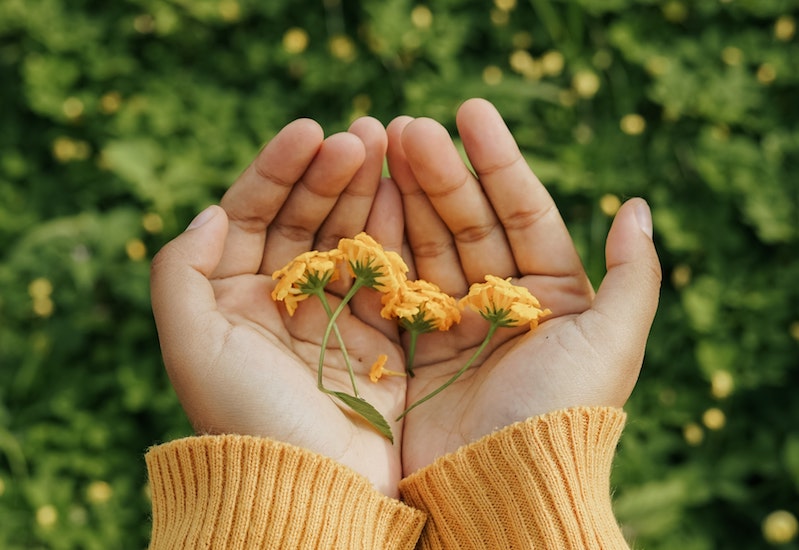We’ve all experienced eco-guilt at times – whether it’s throwing away excessive plastic packaging or feeling like you aren’t doing enough in light of our worsening climate crisis. Eco-perfectionism can get in the way of your well-being and make you lose focus on what really matters.
Sami Aaron, founder of The Resilient Activist, has witnessed how eco-guilt can deflate our enthusiasm and momentum.
“Eco-guilt is very real and growing as more and more people become aware,” Aaron told Greenability, “It’s the feeling that we’re not doing enough or enough of the right things.”
In 2018, Aaron started The Resilient Activist, a non-profit organization in Kansas City that “provides community, self-care, and nature-connected programming that supports emotional well-being as part of vital ecological change.”
Greenability interviewed Aaron to explore how we can move beyond eco-guilt and feeling overwhelmed.
Acknowledge what you’re experiencing
Awareness and self-reflection is a good place to start. “Just bringing up the concept is a great emotional benefit for people,” Aaron said. “Being in a caring community that also has experienced these emotions can help lift some of the guilt.” These topics are often the focus of courses that The Resilient Activist offers.
It’s important to acknowledge that your own emotions and experiences are normal. To put your feelings in perspective, Aaron suggests practicing mindfulness, journaling, and spending time in nature.
One challenge to environmental guilt is that imperfection and mistakes are part of the process and there is always more work to be done and new things we are learning. Aaron recommends practicing shifting your mindset. “Peace comes from the mindset in the Serenity Prayer that helps us reflect on reality – to recognize what we can and cannot change, and to focus on what can be done in the future.” she said.
Another popular mindset comes from chef Anne Marie Bonneau writing about zero waste and eco-guilt. “We don’t need a handful of people doing zero waste perfectly. We need millions of people doing it imperfectly,” Bonneau said.
Practice self-compassion
“Guilt can be a powerful gift with a silver lining that can help us determine what means most to us and can open the door to creative thinking that can give us great insight,” Aaron said.
She recommends taking note of the good things you are doing and practicing self-compassion for what you can’t achieve. “Remind yourself that for every single cause and need in the world, there are many others who are also working on it. If you step away from that one commitment, others will step in to fill the void.”
Engage in meaningful action
To identify what individual actions you can take to alleviate feeling overwhelmed, Aaron suggests focusing on activities that feel life-giving and meaningful to you:
“The point is not to add more activities that increase your stress but to shift your focus to increase those actions that feel good or are easy to do and to reduce or release activities that make you feel weighed down and distraught.”
The American Psychological Association highlights that getting involved with a local organization can give you a sense of purpose and help you reframe issues as community-wide efforts with shared responsibility.
Be a part of the “tipping point”
With the scale and scope of issues like climate change or plastic pollution, the impact of individual actions can feel like a drop in the bucket in comparison to the systemic changes needed from governments and corporations. Aaron suggests humanizing these entities: “I often hear that we have to hold corporations and governments accountable and that our individual actions are irrelevant,” she said. “Corporations don’t make decisions. The people who are owners, managers, staff, vendors, customers, and shareholders are the ones who make the decisions. I can’t state it strongly enough: each action each individual makes is building the groundswell that will spur the environmental movement to where it needs to be.”
To learn more about The Resilient Activist, visit theresilientactivist.org
More on The Resilient Activist
- The Resilient Activist’s Four Steps for a Resilient Life is a guided self-reflection tool to explore transforming feelings of guilt and anxiety into meaningful action.
- Climate Cafe virtual events are hosted monthly featuring a guest speaker and a supportive “thinking and feeling” space with facilitators from The Resilient Activist and a climate-aware therapist. The next event is on Tuesday, January 24.
- Greenability featured a study published in 2022 on climate change anxiety conducted by the University of Kansas Department of Psychology and The Resilient Activist.
- If anyone is experiencing severe emotional distress related to climate change, The Resilient Activist recommends reaching out for individual or group therapy to an experienced mental health professional. A list of such professionals can be found in the newly-created Climate-Aware Therapist Directory, a partnership of the Climate Psychiatry Alliance and the Climate Psychology Alliance of North America.

What can be done with extra Plastic Bags as I try to Recycle every thing?
Hi Mildred, plastic bags and film are not recyclable curbside or at recycling centers. Check with your local grocery store or take them to the nearest retail location that recycles them (i.e. Target, Lowes, Walmart). Retailers often have a recycling station near the entrance.
Where may I recycle wine bottle corks??
Hi Michael, you can find a location to recycle corks with ReCORK at https://recork.com/us/locations. Also, most Whole Foods grocery stores have a cork recycling drop-off located near their dining areas. It’s recommended to call ahead to verify or ask at the store. Synthetic and plastic corks are not accepted.
Some Second Hand and Thrift stores take plastic bags to reuse!